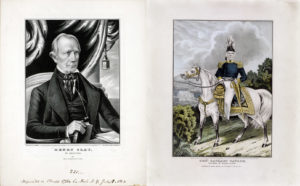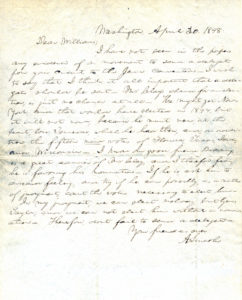Lincoln and the Election of 1848
Abraham Lincoln served a single term in the US House of Representatives, from 1847-1849. By this time, he was no stranger to politics, having been elected to Illinois House of Representatives as a member of the Whig Party four times between 1834 and 1840. With his election for Illinois’s Seventh Congressional District, Lincoln was the only Whig representative for the state, the remainder being Democrats.
The 30th Congress began on March 4, 1847, but the first session did not begin until December 6, making it a year and four months between the time of his election and the time he was seated in the House in Washington, D.C. Many of his peers perceived Lincoln as an unrefined country storyteller, which he used to his advantage as a sophisticated politician. During his term, he coauthored a bill to abolish slavery and compensate slave owners in the District of Columbia, but it failed to get enough support from his own party. He also supported the Wilmot Proviso, a failed attempt to ban slavery in the land annexed by the United States from Mexico in the Mexican War. As the presidential nominating conventions approached in the spring of 1848, Lincoln supported the nomination of General Zachary Taylor over Henry Clay, a leader in Whig politics.

A native of Kentucky, Clay served numerous terms in Congress and one term as Secretary of during the administration of John Quincy Adams. Known for his oratory skills, Clay had many supporters in Congress during his political career and was known for his work to stall dissention over the issue of slavery. Losing presidential bids in 1824 and 1832, Clay founded the Whig Party in 1834 and was nominated as the Whig presidential candidate a decade later. A divisive candidate, Clay’s defeat in that contest diminished his support among Whigs. By the time he ran for office again in 1848, members of his party expressed no confidence in his electability.
Zachary Taylor, on the other hand, was a career officer in the US Army. Born in Virginia and raised in Kentucky, Taylor served in the War of 1812, Black Hawk War, and in conflicts against the Seminole in Florida. Ordered to command a force at the Rio Grande following the United States’ annexation of Texas in 1845, his troops were involved in the skirmish that sparked the Mexican-American War the following year. Winning a series of victories during the conflict, Taylor became a national celebrity and was courted by Whig political leaders as a presidential candidate once the war was over.
 In his letter to Williams, written in April of 1848, Lincoln demonstrates shrewd analysis of the Whig nomination for President in the 1848 election: Mr. Clay’s chance for an election, is just no chance at all. He might get New York, and that would have elected in 1844, but it will not now, because he must now, at the least, lose Tennessee, which he had then, and in addition, the fifteen new votes of Florida, Texas, Iowa, and Wisconsin… In my judgement, we can elect nobody but Gen. Taylor, and we can not elect him without a nomination…
In his letter to Williams, written in April of 1848, Lincoln demonstrates shrewd analysis of the Whig nomination for President in the 1848 election: Mr. Clay’s chance for an election, is just no chance at all. He might get New York, and that would have elected in 1844, but it will not now, because he must now, at the least, lose Tennessee, which he had then, and in addition, the fifteen new votes of Florida, Texas, Iowa, and Wisconsin… In my judgement, we can elect nobody but Gen. Taylor, and we can not elect him without a nomination…
Taylor won both the nomination and the presidency in 1848. A resident of Louisiana, he owned a plantation in Mississippi, and enslaved 100 people, ultimately making his election during a fractured period in American history unfortunate. Although he died in office sixteen months after his inauguration, Taylor brief stint was marred by dissension over the expansion of slavery in the western territories acquired during the Mexican-American War.
The acquisition of this manuscript was made possible by generous donors to the 2022 Watchorn Lincoln Dinner Sponsorship Fund.


